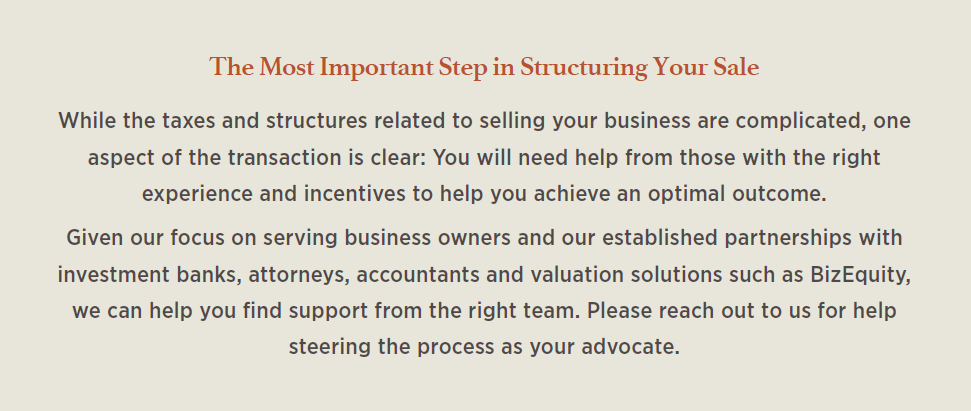Selling your business will likely be one of the most pivotal moments you and your loved ones will ever face. Structuring a sale is complicated, but building a foundation of knowledge can help you prepare for the biggest transaction of your life. The options available to you, and the taxes that will result, depend largely on three variables: your company’s legal structure, the types of assets that make up your business, and the structure of your sale. This bedrock information can help you begin to build a baseline understanding of your options and their tax consequences.
Types Of Business Entities (I)
Sole Proprietorship
You own an unincorporated business by yourself. You must report all business income or losses on your personal income tax return — your company itself is not taxed separately (i.e., “pass-through” taxation).
Partnership
You and at least one other person own your company together, with each person contributing money, property, labor or skill, and sharing in the profits and losses of the business. Your profits and losses pass through to you and your partners, and you each pay your share of taxes as part of your individual income tax returns.
Corporate (C Corp.)
Your Company Is Owned By Shareholders Who Have Exchanged Money, Property Or Both For Your Company’s Capital Stock. For Federal Income Tax Purposes, Your Company Is Recognized As A Separate Taxpaying Entity. It Distributes Profits To Shareholders In The Form Of Dividends. Profits Are Taxed To The Company When Earned And Then Taxed To The Shareholders When Distributed As Dividends, Resulting In A Double Tax.
S Corporation (S Corp.)
Your company passes its income, losses, deductions and credits through to its shareholders for federal tax purposes. Your shareholders report this flow-through on their personal tax returns. This avoids the double taxation on the company’s income.
Limited Liability Corporation (LLC)
This business structure is allowed by state statute, with each state able to use different regulations. Owners under this structure are called “members,” and certain types of businesses, such as banks and insurance companies, are not permitted to be LLCs. Depending on your elections and number of members, the IRS treats your company as either a corporation, a partnership, or as part of the LLC owner’s tax return (a “disregarded entity”). Specifically, a domestic LLC with at least two members is classified as a partnership for federal income tax purposes unless it proactively elects to be treated as a corporation.
Tax Considerations (II)
Taxes related to business sales are complex and depend on the legal entity being sold and the structure of the deal. Here is some basic information about tax treatment to begin educating yourself:
Sale Structures
Beyond taxes, what exactly are the differences between a stock and asset sale? Here is a brief outline of these two sales structures as well as additional structures that you may not yet know exist. Keep in mind that these structures aren’t necessarily mutually exclusive; different elements of each can be combined as part of the final sale.
- ASSET SALE
In an asset sale, you retain legal ownership of your company from which the buyer purchases individual assets, such as equipment, licenses, leaseholds and inventory. The buyer typically does not purchase the company’s cash nor take on its debt. Here are some of the reasons the buyer typically, but not always, prefers an asset sale:
• Tax advantages: As previously mentioned, the buyer can step-up the basis on certain assets to current values and then begin depreciating those assets beginning at higher values, providing greater tax write-offs.
• Reduced liability for the buyer: The buyer can reduce the chances of inheriting liabilities, such as those stemming from contract disputes or product warranties.
• Selective employee retainment: The buyer can decide from the onset which employees to retain. There are certain disadvantages to asset sales, even from the buyer’s perspective, such as the complicated methods of transferring legal ownership of different types of assets, which can slow down the purchase process. - STOCK SALE
In a stock sale, the buyer purchases your company’s stock directly from you and acquires your assets and liabilities as a whole. However, as part of negotiations, the buyer may identify undesired assets and liabilities that can be disposed of prior to the sale, which, in practice, often results in outcomes similar to those that would have happened under an asset sale. However, a stock sale has certain advantages, including:
• Tax advantage for the seller: The proceeds are taxed at more favorable capital gains rates compared to asset sales, which may be subject to higher ordinary income tax rates.
• Reduced liability for the seller: The buyer assumes all risk associated with the company, including, for example, those related to future lawsuits, environmental remediation and employee disputes.
• Lower complexity/cost: Unlike in asset sales, the buyer doesn’t need to pursue costly and time consuming revaluations of the individual assets being acquired. Likewise, the buyer can often acquire certain licenses and permits (e.g., permits for transporting certain materials) without having to seek consent. - STOCK SALE — FOR STOCK
While companies are usually sold for cash, the buyer also can offer you stock in the company under the new ownership. For the buyer, the main advantage is that it reduces or eliminates the buyer’s need to take on debt to fund the acquisition. For you, the seller, the advantages are retaining a future stake in your company and possibly deferring taxes — you wouldn’t need to pay taxes on the portion of the proceeds paid in stock until you sell/transfer the stock in the future. - EARNOUT
An earnout isn’t a type of business sale structure per se but rather a contractual agreement that could be written into any number of structures. It requires the buyer to make additional payments to the seller if certain company performance targets (e.g., for revenue or earnings) are met in the future. Earnouts can be useful in situations where there is a large gap in the buyer’s and seller’s assessments of the company’s value. - INITIAL PUBLIC OFFERING
It is possible, though less likely, that going public with your company through an initial public offering (IPO) of its stock could be the right exit strategy for you. This strategy is typically best suited for relatively large private businesses that stand to benefit significantly from the infusion of capital provided by an IPO and can bear the material costs and ongoing regulatory and governance obligations inherent to managing a public company. The IPO process is relatively arduous and requires careful collaboration with a team of investment bankers, accountants and attorneys that can take months or even years. From a tax perspective, an IPO can be relatively attractive, again, because it defers taxes and because once the stock is eventually sold the taxes paid would generally be taxed at the relatively favorable long-term capital gains rate. - EMPLOYEE STOCK OPTION PLAN
Another structure worth mentioning, an alternative to selling your company to a third-party buyer, is an employee stock option plan (ESOP). To establish an ESOP, you, the owner, sell your shares to a trust (legally set up as a retirement plan) that holds the shares on behalf of your employees, to whom the shares are allocated based on the specifics of the plan. This option can make sense for owners who want to step back from their business while still keeping it intact. It also has potential tax benefits for both you as the owner, and for the company: You may be able to defer capital gains tax, and the company may be able to deduct loan payments on debt used to support the transaction.
I Information in this section is sourced from the Internal Revenue Service, “Business Structures,” https://www.irs.gov/businesses/small-businesses-self-employed/business-structures#:~:text=The%20most%20common%20forms%20of,into%20selecting%20a%20business%20structure. Accessed November 28, 2022.
II Information in this section is sourced from the Internal Revenue Service, “Sale of a Business,” https://www.irs.gov/businesses/smallbusinesses-self-employed/sale-of-a-business. Accessed November 28, 2022





